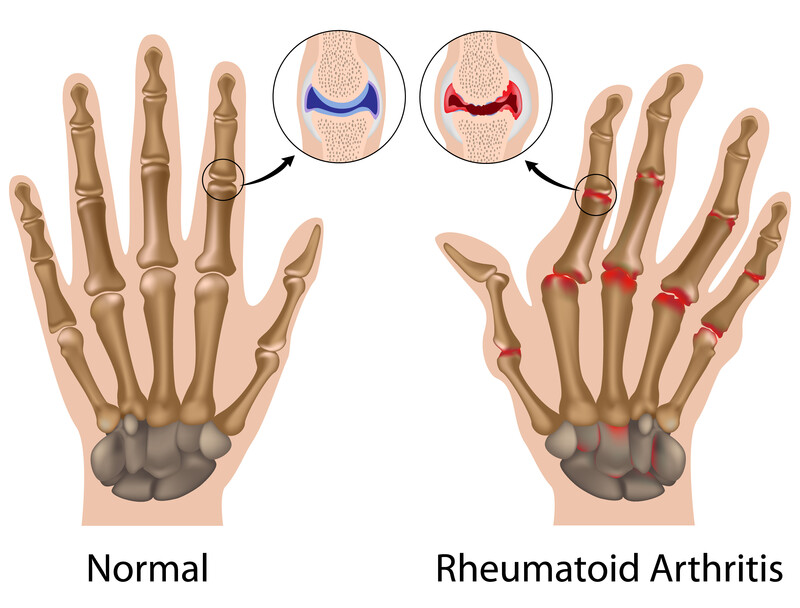Finger arthritis is a condition that affects the joints in your fingers, causing pain and stiffness. It can be caused by many different things such as age, injury, or infection. Symptoms of finger arthritis include pain, swelling, stiffness, and reduced range of motion. Treatment may include medications such as NSAIDs or steroids, physical therapy, or surgery.
What is Finger Arthritis?

Finger arthritis is inflammation of the joints in your fingers. This causes pain, stiffness, and swelling around these joints. Your fingers are made up of many small bones that are held together by ligaments. These ligaments can become inflamed and swollen, causing finger arthritis. It can also be caused by some diseases such as gout or rheumatoid arthritis. Reactive arthritis is another condition that may cause finger arthritis.
There are three bones in each finger: your middle finger has proximal and distal interphalangeal (PIP and DIP) joints, while your ring and small fingers have only proximal interphalangeal (PIP) joints. Finger arthritis can affect any of these four joints.
What Causes Finger Arthritis?
There are many different things that can be the cause, including infection, injury, and age. Infection is a common way for arthritis to develop. The most common cause of infection-related arthritis is bacterial infections such as gonorrhoea or tuberculosis. Other bacterial infections such as leprosy, Lyme disease, and others can also be the cause.
Injury is another common way for finger arthritis to develop. This can be caused by a direct blow, overuse of the fingers, or repetitive motions such as typing or playing the guitar. Sometimes an injury can lead to infection and the combination of the two can result in arthritis.
Older people are more likely to develop it than younger people. This is because some conditions such as rheumatoid arthritis and gout tend to get worse with age. Some also believe that ageing itself may be a cause of finger arthritis, but this is not yet proven.
Symptoms:
The most common symptoms are pain, swelling, stiffness, and reduced range of motion. These symptoms can make it difficult to use your fingers and do everyday tasks. You may also experience a reduction in grip strength.
The pain from finger arthritis can be mild to severe. It may be worse when you use your fingers or when the weather is cold. The swelling may make your fingers look puffy or bloated. The stiffness can make it difficult to move your fingers and doing everyday tasks may be difficult. The reduced range of motion can prevent you from bending your fingers all the way or from fully extending them.
If you have finger arthritis, you may also experience other symptoms such as redness, warmth, and tenderness around the affected joints. These symptoms can make it difficult to move your fingers and even grip or touch items.
Diagnosis:
There is no definitive test for diagnosis. Your doctor will likely ask about your symptoms and medical history. He or she will also do a physical examination to look for swelling, redness, and warmth around the affected joints.
X-rays may be taken to see if there is any damage to the bones in your fingers. If an infection is suspected, then your doctor may order a blood test or culture to check for bacteria
If you are experiencing pain and stiffness in more than one finger, your doctor may diagnose you with rheumatoid arthritis or gout. These conditions can cause finger arthritis as well as other symptoms.
Treatment:
There are many ways to treat finger arthritis, and which treatment you receive will depend on the severity of your condition. Your doctor may recommend over-the-counter medications such as NSAIDs or topical pain relievers. If your pain is more severe and doesn’t respond to these treatments your doctor may prescribe more powerful medications. Steroid injections are sometimes recommended for finger arthritis that doesn’t respond to other treatments. If you have an infection related, then antibiotics may be prescribed.
Physical therapy is another treatment option. Your physical therapist can create a personalised program of exercises designed to strengthen your joints and reduce pain. This may be done by applying heat or cold to your fingers or through other techniques.
Surgery is another option for people with severe finger arthritis that doesn’t respond to other treatments. Your doctor can surgically replace the affected joints, which can reduce pain and improve function in your fingers. It also allows you to get back some range of motion.
Prevention:
There are many things you can do to prevent finger arthritis from developing. The most important is to protect your fingers from injuries. You can do this by wearing gloves when you work with hazardous materials or when it’s cold outside. You should also avoid overusing your fingers and doing repetitive motions. If you play an instrument, be sure to take breaks and stretch your fingers regularly.
If you think you may be at risk, see your doctor who can advise you on the best way to prevent it. They may recommend lifestyle changes or medications that can help keep your joints healthy and strong.
Finger arthritis is an illness that causes discomfort and stiffness in your finger joints. Pain, edema, stiffness, and limited range of motion are some of the symptoms. If you experience any of these symptoms, visit your doctor as soon as possible.







Add Comment